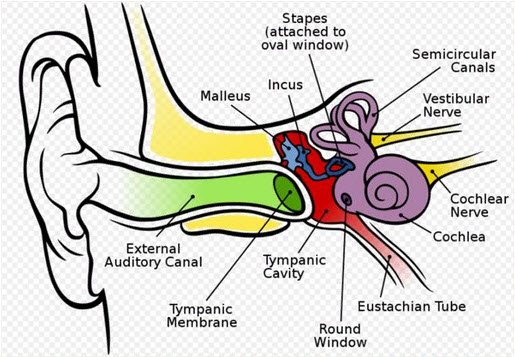Tinnitus
Overview
 Do you ever hear a high pitched ringing in your ears, that doesn’t seem to be coming from the immediate environment around you? Maybe it’s not a ringing, but instead a hissing, pulsing, buzzing, roaring or whistling noise. Perhaps the sound comes and goes intermittently, sometimes just barely audible in the background, while other times drowning out the rest of the world. This isn’t the effect of leaving a loud rock concerts – this is the daily struggle of those suffering from tinnitus. Depending on the individual’s subjective experience, the ringing noise can be so loud and continuous that it decreases the sufferers quality of life through difficulties with concentration, lack of sleep or depression.
Do you ever hear a high pitched ringing in your ears, that doesn’t seem to be coming from the immediate environment around you? Maybe it’s not a ringing, but instead a hissing, pulsing, buzzing, roaring or whistling noise. Perhaps the sound comes and goes intermittently, sometimes just barely audible in the background, while other times drowning out the rest of the world. This isn’t the effect of leaving a loud rock concerts – this is the daily struggle of those suffering from tinnitus. Depending on the individual’s subjective experience, the ringing noise can be so loud and continuous that it decreases the sufferers quality of life through difficulties with concentration, lack of sleep or depression.
Although there are many theories, research has not yet concluded the neuro-anatomical causes of tinnitus. The possibilities include disorders specific to either the outer, middle or inner ear, traumas to the head or neck, growths around nerves in the ear, general conditions like diabetes, high/low blood pressure, allergies and medication. What is certain is that tinnitus is not a disease in itself, but a symptom of another condition. A common misconception is that tinnitus is due to hearing loss – sufferers may still experience normal hearing levels or may have never been subjected to loud, damaging sounds levels for prolonged periods of time.
Treatment possibilities for tinnitus are as varied as theories for its cause: counseling, changes in diet, general relaxation training, auditory habituation and masking are among them. This section of the BFE website presents educational material and software related to the treatment of tinnitus using neurofeedback, based on on-going research.
Team Leaders
This BFE team was started by a single clinician’s interest in this condition:
 Linda Walker – MHR, LCP; As a licensed professional counselor, school counselor, and neurofeedback practitioner, Ms. Walker holds a master’s degree in Human Relations and Counseling from the University of Oklahoma and post graduate certificates in substance abuse and school counseling from Western Michigan University. She integrates a variety of methods, including biofeedback and neurofeedback, in her practice working with a general population, but has spent much of her time focusing on troubled youth, recovering substance abusers and trauma survivors, both in public and private sector in Michigan. Furthermore, she is an instructor and developer for several BFE online classes and software suites.
Linda Walker – MHR, LCP; As a licensed professional counselor, school counselor, and neurofeedback practitioner, Ms. Walker holds a master’s degree in Human Relations and Counseling from the University of Oklahoma and post graduate certificates in substance abuse and school counseling from Western Michigan University. She integrates a variety of methods, including biofeedback and neurofeedback, in her practice working with a general population, but has spent much of her time focusing on troubled youth, recovering substance abusers and trauma survivors, both in public and private sector in Michigan. Furthermore, she is an instructor and developer for several BFE online classes and software suites.
Education
The BFE offers a short list of educational content related to tinnitus. Below is a brief selection of that material. Feel free to click here for a more complete listing.
Tinnitus and Neurofeedback Online Class or Tinnitus and Neurofeedback Online Class Recording: learn all about the latest tinnitus treatment theory based on current research with Linda Walker and how to run a neurofeedback training session to treat tinnitus in this live, interactive online class or by watching the session recordings.
Software
Neurofeedback for Tinnitus Suite by Linda Walker, MHR, LPC
The Neurofeedback for Tinnitus software suite is based on the published work of Dr. Dohrmann and her research group at the Universität Konstanz in Germany, as well as on-going research of Eliana Sapaio, PhD. The software is designed to assess and then help to normalize the activity of several bandwidths and ratios, in particular alpha/delta ratio, through feedback. Included with the suite is a collection of literature, samples of tinnitus questionnaires, sample data from a tinnitus client, and research notes.
Learn More…
Blogs
Software Suites for Tinnitus, Upper Trapezius Evaluation and Insomnia



